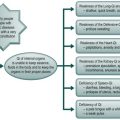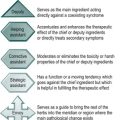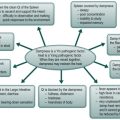8. Syndrome of Heart-Yin deficiency
Manifestations
Main symptoms
Palpitations, restlessness, chest pain and a stifling sensation in the chest, forgetfulness, insomnia, warm palms and soles, dry throat and tongue, night sweats.
Secondary symptoms
Irritability and anxiousness.
Tongue
Red and dry.
Pulse
Thready and rapid.
Associated disorders in western medicine
Heart diseases, hypertension, mental disorders.
Analysis of the syndrome
The Heart is located in the Upper-Jiao. It is a fire organ in the Five-Element system and it houses the shen, governs the blood circulation and is considered as the chief of the other internal organs.
• When the Yin is too weak to nourish the Heart, support the blood circulation and settle the mind, palpitations, restlessness, chest pain and a stifling sensation in the chest may present.
• If the empty-heat is generated by Yin deficiency, the heat may disturb the Heart-shen and one may have difficulty in falling asleep.
• In a severe or chronic case, the empty-heat of the Heart may cause irritability and forgetfulness due to anxiousness.
• Yin deficiency can lead directly to night sweats, and warm palms and soles.
• A red and dry tongue and a thready and rapid pulse indicate Yin deficiency.
Treatment principle: Tonify the Heart-Yin
Herb selection principles and formula composition strategies
• First, herbs that are sweet and cold, enter the Heart meridian and are able to nourish the Heart-Yin are selected.
• Second, sweet and cold herbs that enter the Kidney and Lung meridians are selected to nourish the Kidney-Yin and Lung-Yin, and control the Heart-heat. It is equally important to prescribe herbs that tonify the Lung-Qi and Spleen-Qi in order to promote Yin generation.
• Third, herbs that reduce or descend the fire and calm the mind are selected.
Structure of the formula and selection of herbs
Chief: Nourish the Heart-Yin
Xi Yang Shen ( Panacis quinquefolii radix)
Xi Yang Shen is bitter, cold and slightly sweet, and enters the Heart, Lung and Kidney meridians. It is quite a strong herb to tonify the Yin and Qi of these organs and is able to reduce heat. It is particularly useful in severe and chronic conditions of Heart-Yin and Heart-Qi deficiency.
Sheng Di Huang ( Rehmanniae radix)
Sheng Di Huang is sweet and cold, and enters the Kidney, Heart and Liver meridians. It is a quite powerful herb to nourish the Yin of these organs and can sufficiently reduce heat. Sheng Di Huang is also a very important herb to relieve anxiousness, chest pain and palpitations because it can cool the blood. As a result, it is often selected as chief in the formula to nourish the Heart-Yin.
Mai Men Dong ( Ophiopogonis radix)
Mai Men Dong is sweet and slightly cold, and enters the Lung, Heart and Stomach meridians. It is often selected in the formula to nourish the Heart-Yin and relieve anxiousness. In addition, it is often used in the anaphase of febrile diseases where the Yin of the Heart and Lung has been injured by heat.
Deputy: Nourish the Kidney-Yin and Lung-Yin and tonify the Spleen-Qi
Bai He ( Lilii bulbus)
Bai He is sweet, bland and slightly cold, and enters the Lung and Heart meridians. It has a moistening and lubricating property. It can moisten the Lung and Heart directly and is particularly selected for treating anxiety and restlessness. It is also used in conditions where the Lung-Yin and Heart-Yin are both consumed by heat in febrile diseases.
Dang Shen ( Codonopsis radix)
Dang Shen is sweet and neutral, and enters the Spleen and Lung meridians. It has no function in nourishing the Yin, but it can tonify the Qi in order to generate Yin. It is used in conditions where the Yin and Qi are both injured at the same time. It is also used when the Spleen and Stomach cannot bear very cold herbs in the process of tonifying the Yin.
Assistant: Clear the empty-heat and calm the mind
Xuan Shen ( Scrophulariae radix)
Xuan Shen is bitter, salty and cold, and enters the Kidney meridian. It cannot tonify the Heart-Yin directly, but it can lift the Kidney water from the Lower-Jiao to reduce the Heart-fire in the Upper-Jiao. Thus, it is often selected in formulas to treat conditions where the Heart-Yin is deficient due to intense empty-fire in the Heart.
Bai Zi Ren ( Platycladi semen)
Bai Zi Ren is sweet and neutral. It enters the Heart meridian primarily and the Spleen, Kidney and Liver meridians secondly. It can tonify the Heart-Qi, nourish the blood and calm the mind. It is often used in the formula to treat chronic conditions of palpitations, restlessness and anxiousness. At the same time, it can stop night sweats and improve sleep.
Wu Wei Zi ( Schisandrae fructus)
Wu Wei Zi is sour and warm, and enters the Lung, Heart and Kidney meridians. It can be applied in the condition of Heart-Yin deficiency as it can stabilize the Heart-Yin, stop sweating and stabilize the Heart-Qi so as to relieve palpitations.
Envoy: Harmonize the herbs in the formula
Zhi Gan Cao ( Glycyrrhizae radix preparata)
Zhi Gan Cao is sweet and moist in nature. It can moisten the Heart and tonify the Spleen-Qi so as to benefit generation of the Yin. In addition, the sweet nature of Zhi Gan Cao can harmonize the herbs in the formula and protect the Stomach and Spleen from cold herbs.
Common accompanying symptoms and treatment
• Heart-Yin deficiency with blood deficiency: add Long Yan Rou ( Longanae arillus) and Bai Shao Yao ( Paeoniae radix lactiflora) to nourish the blood.
• Yin deficiency with excess heat: add Huang Lian ( Coptidis rhizoma) to clear the heat.
• Heart-Yin and Lung-Yin are both deficient: use Bei Sha Shen ( Glehniae radix), Bai He ( Lilii bulbus) and Sheng Di Huang ( Rehmanniae radix) to nourish the Yin.
• Liver-Qi stagnation with Liver-heat: add Xia Ku Cao ( Prunellae spica) and Bai Shao Yao ( Paeoniae radix lactiflora) to spread the Liver-Qi, reduce the Liver-heat and soften the Liver.
Examples of classical formulas
Sheng Mai San (Generate the Pulse Powder) 
Source: Nei Wai Shang Bian Huo Lun 
Composition
Ren Shen ( Ginseng radix) 10 g
Mai Men Dong ( Ophiopogonis radix) 15 g
Wu Wei Zi ( Schisandrae fructus) 6 g
Analysis of the formula and commentary on strategies
Sheng Mai San is a formula for treating both Qi and Yin deficiency of the Heart and Lung. It treats the syndrome of Heart-Yin deficiency caused by chronic disease, prolonged intense stress and emotional disturbance; it also relieves symptoms such as palpitations, restlessness, anxiousness, anxiety, tiredness and sweating.
In this formula, all three herbs enter the Heart meridian:
• The sweet Ren Shen with cold Mai Men Dong and sour Wu Wei Zi can generate and stabilize the Yin.
• Ren Shen can strengthen the Heart-Qi. With the help of Wu Wei Zi, which stabilizes the Heart-Qi, the function of strengthening the Qi becomes very strong.
• When these three herbs are used together, the pulse becomes strong and regular as the Yin and Qi are sufficient, just as described in the name of the formula.
Tian Wang Bu Xin Dan (Emperor of Heaven’s Special Pill to Tonify the Heart) 
Source: She Sheng Mi Pou 
Composition
Sheng Di Huang ( Rehmanniae radix) 120 g
Mai Men Dong ( Ophiopogonis radix) 60 g
Tian Men Dong ( Asparagi radix) 60 g
Xuan Shen ( Scrophulariae radix) 15 g
Dan Shen ( Salviae miltiorrhizae radix) 15 g
Dang Gui ( Angelicae sinensis radix) 60 g
Ren Shen ( Ginseng radix) 15 g
Suan Zao Ren ( Ziziphi spinosae semen) 60 g
Bai Zi Ren ( Platycladi semen) 60 g
Wu Wei Zi ( Schisandrae fructus) 15 g
Fu Ling ( Poria) 15 g
Jie Geng ( Platycodi radix) 15 g
Yuan Zhi ( Polygalae radix) 15 g
Zhu Sha ( Cinnabaris)* (as coating of the pills)
Analysis of the formula
This formula is devised for treating Heart-Yin and Kidney-Yin deficiency with empty-heat in these organs. The disorder is manifested as anxiousness, irritability, palpitations, difficulty in falling asleep, forgetfulness, nocturnal emissions and tiredness. The dryness due to Yin deficiency and fire consumption causes constipation, a dry mouth and ulcers on the tongue. The red tongue without coating and the rapid, restless and thready pulse indicate Yin deficiency with empty-heat.
This formula focuses on tonifying the Heart-Yin and Kidney-Yin and calming the mind:
• Sheng Di Huang, as chief, is used in the largest dosage in the formula. It is sweet and very cold, and enters the Heart and Kidney meridians. It can powerfully nourish the Yin of the Heart and Kidney, reduce the heat and cool the blood.
• The deputies are Mai Men Dong and Tian Men Dong, which are also sweet and cold. They can strongly tonify the Heart-Yin and Kidney-Yin respectively, and therefore enhance the abilities of Sheng Di Huang.
• The assistant herbs can be divided into three groups:
– The bitter and cold Dan Shen and Xuan Shen are able to cool the blood and reduce the fire from the Heart and Kidney respectively.
– Suan Zao Ren, Bai Zi Ren, Zhu Sha, Fu Ling and Yuan Zhi calm the mind, relieve anxiousness and improve sleep.
– Ren Shen tonifies the Qi, Dang Gui tonifies the blood and Wu Wei Zi stabilizes the Heart-Qi. They consider the Qi and blood conditions in the pathological development of the syndrome of Yin deficiency.
• Jie Geng, as envoy, guides the herbs entering the Upper-Jiao.
Commentary on strategies
• This formula is quite strong in tonifying the Yin of the Heart and Kidney. It also treats the other symptoms that are caused directly by Yin deficiency.
• Moreover, the conditions of Qi and blood in the syndrome of Yin deficiency are also considered and treated.
• The tonifying method and reducing method are combined in one formula and the dosages are well balanced. Thus this formula can be used in both acute and chronic conditions of Yin deficiency of the Heart and Kidney.
• Zhu Sha ( Cinnabaris) is prescribed in the source book for this formula. It was used to calm the mind and reduce heat in ancient times. As a poisonous heavy metal, its use is now forbidden in many countries. However, it can be used in a very small dosage as a coating for herbal pills, as in this formula.




